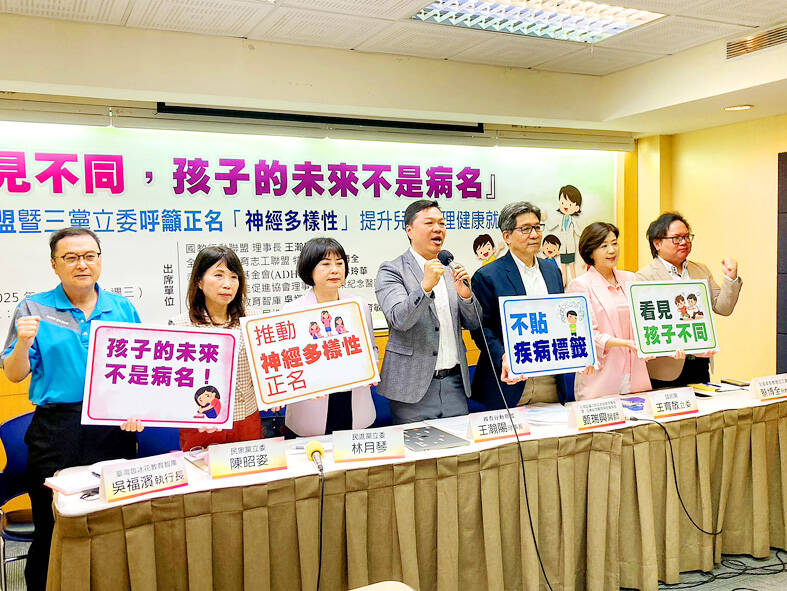The Action Alliance on Basic Education yesterday urged the government to stop using the terms “psychiatric disorder” and “mental illness,” and instead use the term “neurodiversity” to make children and parents more willing to seek treatment.
Changing the terminology could increase the number of children willing to be treated from 2.8 percent to 15 percent within three years, it said.
The Ministry of Health and Welfare should work with the Ministry of Education to remove inappropriate terminology from the medical, education and welfare sectors, alliance president Wang Han-yang (王瀚陽) said.

Photo: Yang Mien-chieh, Taipei Times
One in four children aged eight to 15 have experienced psychiatric disorders within the past six months, but only one-tenth of them are receiving medical care or support services, the group said.
Although the prevalence rate of children in the age group with attention deficit hyperactivity disorder (ADHD) is 10 percent, only 2 percent have been diagnosed, and only 1 percent have been treated, it said, adding that the discrepancy was concerning.
Many parents and educators lack a general understanding of ADHD and other neurodevelopmental differences, and some parents refuse to seek medical treatment for fear that their children would be seen as different, Wang said.
Citing health ministry statistics, Wang said that more than 20 percent of children who have experienced domestic abuse have ADHD, delayed development or other neurodevelopmental issues, adding that children with these differences have been misunderstood as showing willful disobedience.
The use of corporal punishment only feeds a vicious cycle, he said.
To increase people’s willingness to seek medical treatment, the government should facilitate collaboration between hospitals and welfare facilities to launch adolescent physical and psychiatric health evaluations, he said.
The government needs to increase the amount of resources allotted to hospitals and the number of mental professionals to provide effective treatment, or to ensure that symptoms are detected early to refer affected people to capable facilities, Wang said.
Taiwan used to refer to dementia as “lao ren chi dai” (老人癡呆, literally “older people’s dull-wittedness”), but that is no longer used as it was considered disrespectful toward older people, Far Eastern Memorial Hospital Department of Neurology doctor Yan Sui-hing (任瑞興) said.
Japan and Hong Kong have also changed the names of conditions to make them more neutral, Yan said.
Parents do not want their children to be referred to as hyperactive, a recluse or as having psychiatric disorders, he said, adding that resentment toward the use of such names makes parents unwilling to take their children to be diagnosed or treated.

NOT AN OPENING: Trump’s violation of international law does not affect China’s consideration in attacking Taiwan; Beijing lacks capability, not precedent, an official said Taiwanese officials see the US’ capture of the president of Venezuela as a powerful deterrent to Beijing’s aggression and a timely reminder of the US’ ability to defeat militaries equipped with Chinese-made weapons. The strikes that toppled Venezuelan President Nicolas Maduro signaled to authoritarian leaders, including Chinese President Xi Jinping (習近平), US President Donald Trump’s willingness to use military might for international affairs core to US interests, one senior official in Taipei’s security circle said. That reassured Taiwan, the person said. Taipei has also dismissed the idea that Trump’s apparent violation of international law could embolden Beijing, said the official, who was not

US President Donald Trump said "it’s up to" Chinese President Xi Jinping (習近平) what China does on Taiwan, but that he would be "very unhappy" with a change in the "status quo," the New York Times said in an interview published yesterday. Xi "considers it to be a part of China, and that’s up to him what he’s going to be doing," Trump told the newspaper on Wednesday. "But I’ve expressed to him that I would be very unhappy if he did that, and I don’t think he’ll do that," he added. "I hope he doesn’t do that." Trump made the comments in

A cold surge advisory was today issued for 18 cities and counties across Taiwan, with temperatures of below 10°C forecast during the day and into tonight, the Central Weather Administration (CWA) said. New Taipei City, Taipei, Taoyuan and Hsinchu, Miaoli and Yilan counties are expected to experience sustained temperatures of 10°C or lower, the CWA said. Temperatures are likely to temporarily drop below 10°C in most other areas, except Taitung, Pingtung, Penghu and Lienchiang (Matsu) counties, CWA data showed. The cold weather is being caused by a strong continental cold air mass, combined with radiative cooling, a process in which heat escapes from

Snow this morning fell on Alishan for the first time in seven years, as a strong continental cold air mass sent temperatures plunging across Taiwan, the Central Weather Administration (CWA) said. The Alishan weather station, located at an elevation of about 2,200m in central Taiwan, recorded snowfall from 8:55am to 9:15am, when the temperature dropped to about 1°C, the CWA said. With increased moisture and low temperatures in the high-altitude Alishan area, the conditions were favorable for snow, CWA forecaster Tsai Yi-chi (蔡伊其) said. The last time snow fell at the Alishan weather station was on Jan. 10, 2018, while graupel fell there